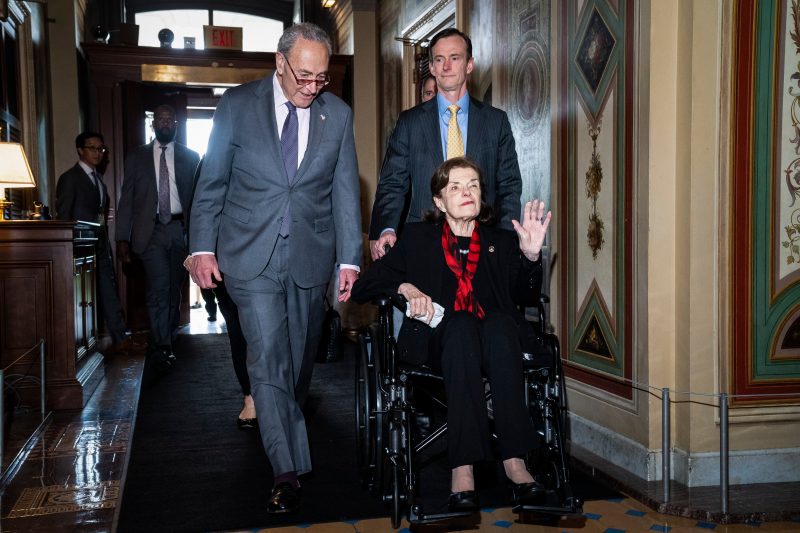
Feinstein, recovering from shingles, casts Senate vote after long absence
Sen. Dianne Feinstein (D-Calif.) returned to the U.S. Capitol on Wednesday afternoon and cast her first vote in more than two months, marking the end of a lengthy health-related absence that had complicated matters for Senate Democrats and their narrow majority.
Feinstein, who at 89 is the oldest member of the Senate, had been absent since February after she was hospitalized with shingles. She flew back to Washington on Tuesday night but was not at the Capitol on Wednesday morning and missed the first Senate vote just after noon.
Just before 3 p.m. Wednesday, Feinstein arrived outside an entrance to the Senate in a gray sedan, where she was greeted by Senate Majority Leader Charles E. Schumer (D-N.Y.) and walked gingerly to a wheelchair.
Responding to reporters’ questions about how she was feeling, Feinstein said she was “much better.”
Shortly after 3 p.m., an aide wheeled Feinstein into the well of the Senate. A vote was underway to confirm one of President Biden’s nominees, Glenna Laureen Wright-Gallo, as an assistant secretary at the Education Department.
“Aye,” Feinstein said, raising her hand to cast a vote to support the nomination. Sen. Richard J. Durbin (D-Ill.), chairman of the Senate Judiciary Committee, walked over and shook her hand to welcome her back, as did a few other senators.
@DianneFeinstein returns to Capitol Hill after taking a nearly three-month absence due to health problems pic.twitter.com/EQrZZemfwT
— Camila DeChalus (@cdechalus) May 10, 2023
In a statement Wednesday afternoon, just before she went to the Capitol, Feinstein noted she had not yet fully recovered from her bout with shingles.
“Even though I’ve made significant progress and was able to return to Washington, I’m still experiencing some side effects from the shingles virus,” Feinstein said. “My doctors have advised me to work a lighter schedule as I return to the Senate. I’m hopeful those issues will subside as I continue to recover.”
Feinstein initially said she hoped to return in late March after receiving treatment in San Francisco. As the weeks passed with no return, however, a handful of congressional Democrats began calling for the senator, who is a member of the Judiciary Committee, to resign from the Senate.
Her lengthy absence stalled confirmations of some of Biden’s judicial nominees, given that only judges with some Republican support can move to the floor without her tiebreaking vote on the committee. Her vote could also be crucial in negotiations over lifting the debt ceiling.
“The Senate faces many important issues, but the most pressing is to ensure our government doesn’t default on its financial obligations,” Feinstein said Wednesday. “I also look forward to resuming my work on the Judiciary Committee considering the president’s judicial nominees.”
Feinstein’s allies, including former House speaker Nancy Pelosi (D-Calif.), pushed back on the calls for the senator to retire and suggested that there was a sexist double standard in how Feinstein’s absence was treated compared with those of male senators. In recent months, Senate Minority Leader Mitch McConnell (R-Ky.) and Sen. John Fetterman (D-Pa.) were out for weeks for medical reasons.
Though Feinstein has waved off questions about her age and ability to serve, she has also relinquished key roles in recent years. She stepped down as the top Democrat on the Senate Judiciary Committee before the 117th Congress, when she would have been the first woman to lead that committee. And last year, Feinstein declined consideration to become president pro tempore of the Senate, the position third in line to the presidency that traditionally goes to the most senior senator of the party in power. The role instead went to Sen. Patty Murray (D-Wash.).
Feinstein also announced this year that she would not seek reelection in 2024, kicking off a competition among California Democratic Reps. Adam B. Schiff, Barbara Lee and Katie Porter for the seat.
Paul Kane, Camila DeChalus and Liz Goodwin contributed to this report.
